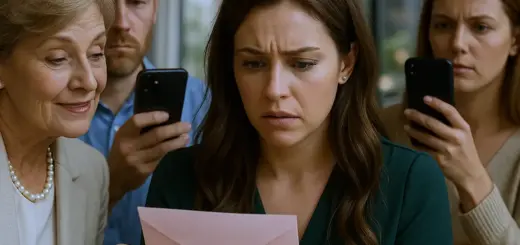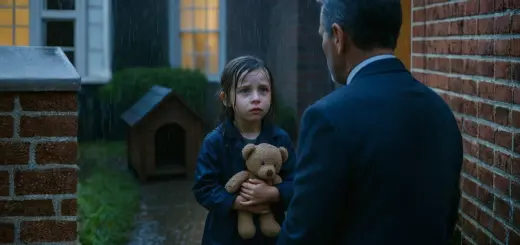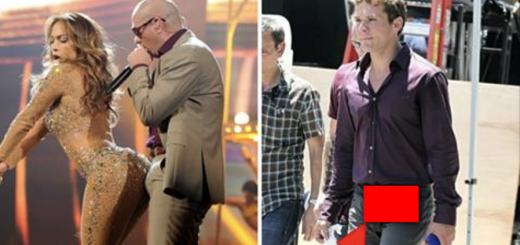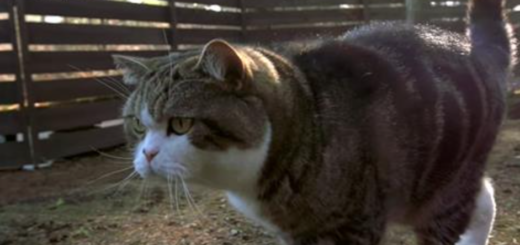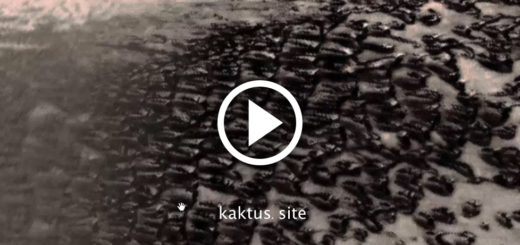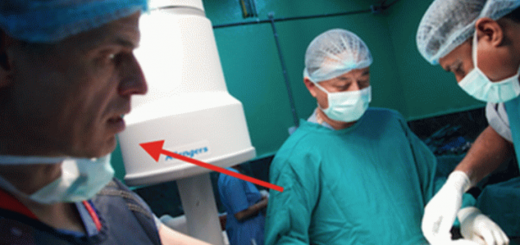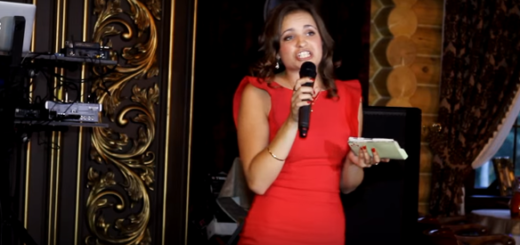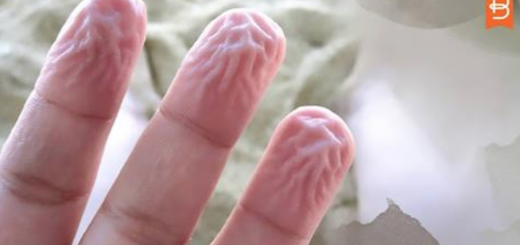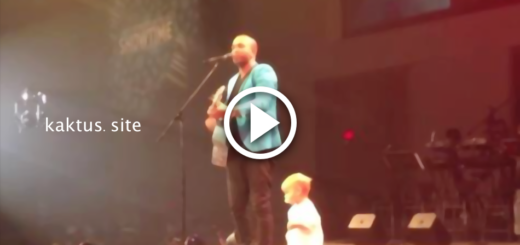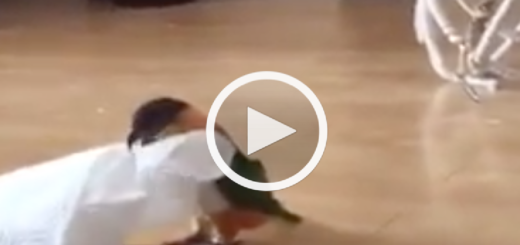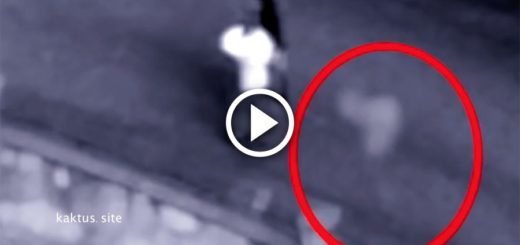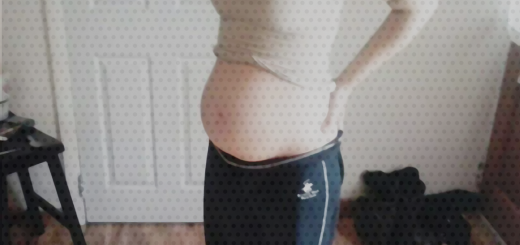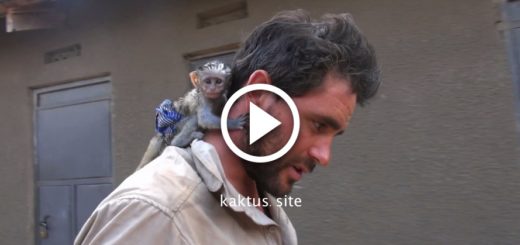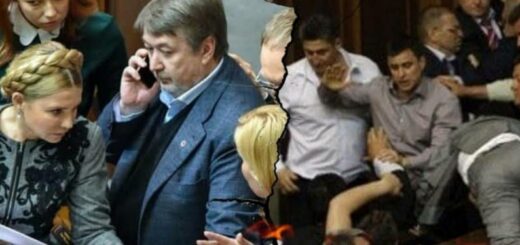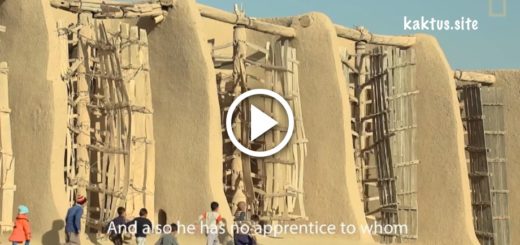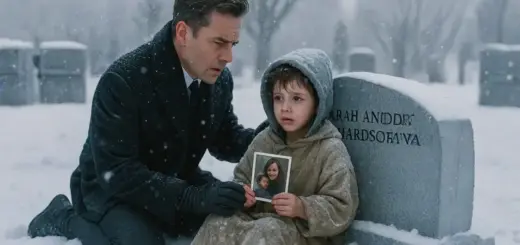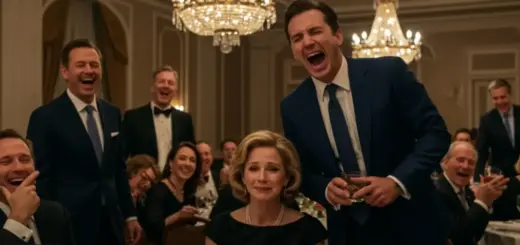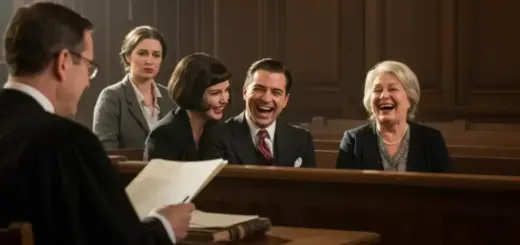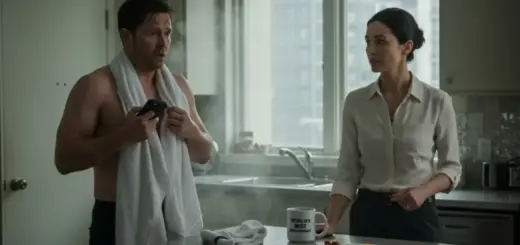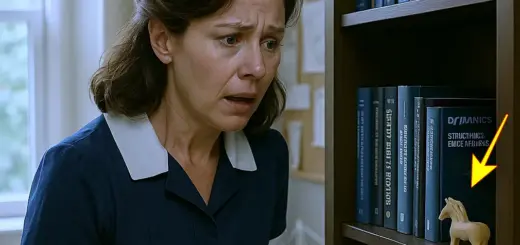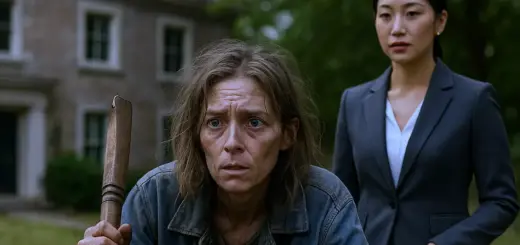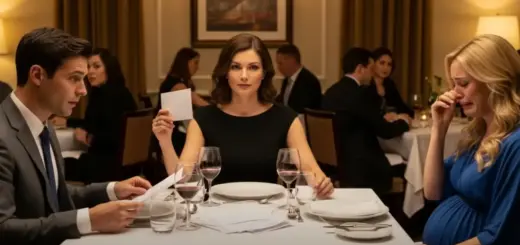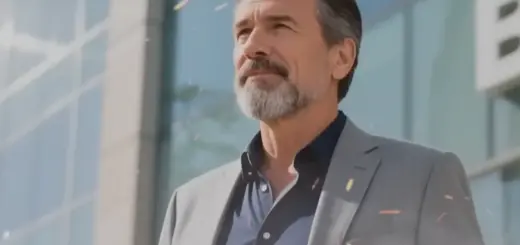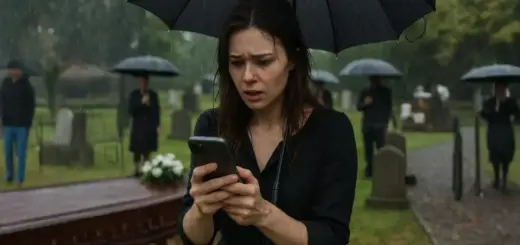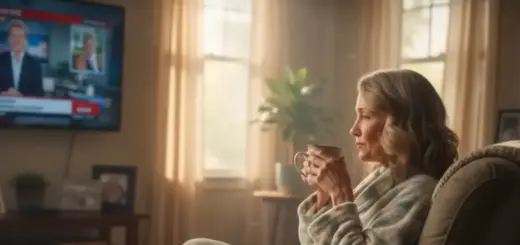«He was very proud of you,» Margaret said softly. «He told me once that your talent was wasted but not lost. That you’d find your way back eventually.» Victoria appeared in the doorway. «The board meeting is in an hour. Would you like to change?»
Margaret had clothing delivered. In the bedroom, I found a closet full of professional attire, quality power suits. I chose a navy blue one that made me feel like the architect I’d never gotten to be.
Downstairs, a man in his late 30s stood with Victoria. Tall, dark hair with hints of gray. Kind but assessing eyes. «Sophia Hartfield,» he said, extending his hand. «I’m Jacob Sterling, senior partner at Hartfield Architecture. I worked with your uncle for 12 years.»
«The Jacob Sterling? You designed the Seattle Public Library expansion.» His eyebrows rose. «You know my work?»
«I know everyone’s work. I might not have practiced, but I never stopped studying. Your library expansion incorporated biophilic design principles most architects ignore. It was brilliant.» Something shifted in his expression. «Then you’re not just Theodore’s charity case. Good. The board is going to test you immediately.»
«Jacob,» Victoria warned. «No, he’s right,» I said. «They’re expecting me to fail. Uncle Theodore knew that too.»
Jacob smiled. «Theodore said you were brilliant but beaten down. He said the woman who walked into that boardroom would tell us everything we needed to know about whether you’d survived intact.» I thought about Richard. About dumpster diving. About Uncle Theodore maintaining a studio, hoping I’d use it someday.
«Then let’s not keep them waiting.»
The Hartfield Architecture offices occupied three midtown floors. Staff turned to stare as we entered. In the conference room, eight people sat around a table, all looking at me like an unwelcome intruder.
«Ladies and gentlemen,» Victoria began. «This is Sophia Hartfield, Theodore Hartfield’s great-niece and the incoming CEO of this firm.» A man in his 50s leaned back. «With all due respect, Ms. Hartfield has never worked a day in this industry. This decision shows Theodore wasn’t thinking clearly.»
«Actually, Mr. Carmichael,» I said steadily, «my uncle was thinking perfectly clearly. He knew this firm needed a fresh vision, not the same old guard clinging to past glory.» I pulled out a notebook. «This is a sustainable mixed-use development I designed three years ago. Rain gardens, green roofs, passive solar design. I have 16 more notebooks like this. Ten years of designs created in secret because my ex-husband thought architecture was a cute hobby.»
Carmichael flipped through it, his expression unchanged, but other board members leaned in. A woman spoke up. «Even if your designs are good, running a firm requires business acumen, client relationships, and project management.»
«You’re right,» I agreed. «Which is why I’ll rely heavily on the existing team, particularly Jacob. I’m not here to pretend I know everything. I’m here to learn, to lead, and to honor my uncle’s legacy while bringing new ideas. If you can’t handle working for someone who wants to push forward instead of maintaining comfortable mediocrity, you’re welcome to leave.»
Victoria pulled out contracts. «Those who wish to stay will sign new agreements. Those who don’t can collect severance. You have until the end of business today.» As the meeting dispersed, Jacob approached. «That was well played. You made enemies of half the board.»
«But the half that matters respects you. Did I make an enemy of you?» «Theodore told me a year ago that if anything happened, I should help you succeed. He said you’d been buried alive for too long. And when you broke through, you’d be unstoppable. I think he was right.»
I looked out at the Manhattan skyline. «He usually was, though his taste in board members could use work. Carmichael looks like he eats kittens for breakfast.» Jacob laughed. «You’re going to do just fine here.»
My first week was a crash course in everything I’d missed. Jacob became my shadow, walking me through projects, introducing clients, and explaining office politics. It felt like coming home to a place I’d never been.
«Your uncle had a specific management style,» Jacob explained in my new office—Theodore’s space, cleaned except for his favorite pieces. A 1970s drafting table worn smooth, a leather chair smelling faintly of his cologne, and architectural models of his famous buildings.
«Let me guess,» I said. «Terrifying, brilliant, and impossible to please.» Jacob laughed. «Close. He demanded excellence but gave freedom to find your own path. He’d rather see a spectacular failure than mediocre success.»
I understood that philosophy. Uncle Theodore had been the same when I was younger. My computer pinged. An email from Carmichael to all senior staff: «Moving forward, all design decisions require board approval before client presentation.»
I looked at Jacob. «That’s not how Uncle Theodore ran things.» «No, Theodore trusted his architects. Carmichael’s trying to undermine you.»
I hit «Reply All.» «This policy is rejected. Hartfield Architecture succeeded because we trusted our designers’ expertise. Board approval is required only for projects exceeding $10 million, as outlined in the company charter.» I hit send. Jacob’s eyebrows rose. «You just made him look foolish.»
«Good. Richard spent 10 years making me second-guess every decision. I’m done letting men tell me I need permission.» Carmichael responded within minutes, requesting a private meeting. I agreed, with Jacob present. When Carmichael entered, his expression was cold.
«Ms. Hartfield, I’m trying to protect this company’s reputation.» «By circumventing protocol and undermining the CEO? Interesting strategy.»
«Your uncle left me 30% of this company. I’ve been here 23 years. I’m not watching you destroy what we built.» I leaned back in Theodore’s chair. «Let me be clear. My uncle left me controlling interest. You can work with me or against me. But if you choose against me, you’ll lose. I suggest you spend the weekend thinking carefully about which path serves your interests.»
After he left, Jacob whistled. «Where did that come from?» I smiled, hands shaking. «From three months of eating garbage and deciding I’d rather fail on my own terms. Also, I’ve been binge-watching Succession. Learned some things.»
That evening, exploring the office alone, I found folders in Theodore’s cabinets labeled with my name by year. My undergraduate work. Articles about my wedding. Photos at various stages of my marriage, my smile growing hollow. In the recent folder were newspaper clippings about my divorce, court documents showing how badly I’d been screwed.
Underneath was a letter in Theodore’s handwriting, dated two months before he died. «Sophia, if you’re reading this, you finally came home. I’m sorry for being stubborn. I should have called a thousand times. But I was hurt you’d chosen so poorly. And by the time I swallowed my pride, too much time had passed. I watched you diminish yourself year after year. I wanted to intervene, but Margaret convinced me you needed to find your own way out.»
«She was right. You had to choose to leave. This company was always meant for you. From the moment you moved in at 15 and studied my blueprints, I knew you’d be my successor. Not because you’re family, but because you’re brilliant. Your studio contains something special in the bottom-right filing cabinet drawer. Use them wisely. And Sophia, I’m proud of you. I was always proud, even when I was too stubborn to say it. T.»
At the estate, I found the filing cabinet. The drawer was locked, but a key was taped underneath. Inside were 17 leather portfolios, each labeled with a year. Theodore’s early designs. His actual working sketches. Not polished versions, but the messy, real process. Failed attempts. Revised ideas. Notes about what worked and what didn’t. Each portfolio represented a year of his evolution. This was architectural history.
The note in the recent portfolio made me cry. «These are my failures. My false starts. Terrible ideas that became good ones. I’m giving you this because young architects need to see that even a legend struggled. Use them to teach, to inspire, to remind yourself that brilliance isn’t born fully formed. It’s built, one imperfect sketch at a time. Just like you’re building yourself back now. Love, T.»
By morning, I had an idea. When Jacob arrived, I was sketching frantically. «What are you working on?» «A mentorship program. The Hartfield Fellowship. We’ll bring in architecture students from diverse backgrounds. Show them these portfolios. Let them learn from Theodore’s process. Real project experience. Paid internships. Actual involvement.»
Jacob studied my sketches. «That’s expensive and time-consuming.» «That’s the point. We’re not just building buildings. We’re building the next generation. Theodore would have loved that.»
«He would have,» Jacob agreed softly. «You’re not trying to be Theodore. You’re being exactly who he hoped you’d become.» I looked up at him. «Thank you for not treating me like I need to prove myself every second.»
«You proved yourself on day one. Everything since is just confirmation.» My phone buzzed. An unknown number. I opened it and froze. «Congratulations on your inheritance. Guess you landed on your feet. We should talk. R.» Richard. He’d found out through the Architectural Digest article about my appointment. Typical.
I showed Jacob, whose expression darkened. «Want me to handle it?» I looked at Richard’s desperate attempt to worm his way back into my life now that I had money, and I felt nothing. Just distant pity. «No,» I said, deleting and blocking the number. «He doesn’t deserve any response. He’s already disappearing from my story.» And it was true. Richard was becoming irrelevant. A footnote in a much better story.
The Anderson Project was my first major client presentation as CEO. A tech billionaire wanted a cutting-edge Seattle headquarters, sustainable and statement-making. Exactly what Hartfield Architecture was known for. I’d spent three weeks on the design with our engineers: a green roof, rainwater collection, smart glass optimizing light and temperature. The building would be alive, responsive. Jacob called it exceptional. Theodore would be proud.
The presentation was scheduled for 10 a.m. At 9:45, I arrived to find my laptop missing. My models were there, but the computer with my presentation was gone. «Looking for this?» Carmichael stood in the doorway, holding my laptop. «Found it in the break room. Someone must have moved it.» Right. And I’m the Queen of England.
But I didn’t have time to argue. I opened the laptop and pulled up my presentation. It loaded normally, but connecting to the projector, my stomach dropped. The file was corrupted. Slides were jumbled. Images were missing. Renderings were replaced with error messages.
«Everything okay?» Jacob asked, entering with the clients. I had 30 seconds to decide. Panic. Postpone. Admit defeat. Or do what Theodore would have done. «Actually,» I said, closing the laptop with a smile, «let’s do this differently. Mr. Anderson, you said you wanted a building that tells a story. Let me tell you that story.»
I moved to the whiteboard and started sketching, my hand moving with confidence built over 10 years. I drew the building’s silhouette, explaining how the shape was inspired by the landscape, how every angle had a purpose. «Traditional architecture treats buildings as static objects,» I said, sketching details. «But your headquarters will be dynamic. Alive.»
I drew arrows showing airflow, water collection, seasonal sun angles. «In summer, the smart glass darkens automatically. In winter, it opens to maximize passive solar heating.» Anderson leaned forward, his eyes bright. I kept drawing, kept talking, explaining every choice. Jacob handed me colored markers, and I added depth, shadow, and life. By the time I finished 45 minutes later, the whiteboard was covered in a comprehensive representation of my vision. Raw, honest, clearly genuine passion.
Anderson stood, examining the board. «This is exactly what I wanted. Someone who understands buildings as living systems. When can you start?» After they left, having agreed to terms immediately, I finally breathed. Jacob was grinning. «That was extraordinary. Someone corrupted my files. This was sabotage.»
«I know. Carmichael borrowed your laptop yesterday, said he wanted to review timelines.» «It doesn’t matter. He wanted me to fail. Instead, I showed everyone I don’t need fancy presentations. The work speaks for itself.»
That evening, I called an emergency board meeting with Victoria as legal counsel. «I want to address what happened this morning. My files were deliberately corrupted to undermine my credibility.» Carmichael shifted uncomfortably. «That’s a serious accusation.»
«It is. Which is why I had IT trace the modifications. They originated from your computer, yesterday at 6:47 p.m.» Silence. Carmichael’s face reddened. «I was reviewing files. If something was accidentally modified—»
«There was nothing accidental about corrupting every backup,» Jacob said coldly. «I was testing her,» Carmichael snapped. «Theodore left this company to an untested amateur.»
I laughed. «You wanted to see if I’d crumble? Mr. Carmichael, I spent three months living out of a storage unit. I dumpster-dove for furniture to sell for food. You corrupting my files doesn’t even register. But sabotaging company interests to serve your ego makes you a liability.» I stood. «Here’s what’s happening. You’ll resign immediately. In exchange, the company will buy out your 30% stake at fair market value, and you’ll sign a non-disparagement agreement. Or I file formal complaints, which will involve lawyers and destroy your reputation. Your choice. You have until the end of business tomorrow.»
After the meeting, Jacob found me at the window. «You handled that perfectly.» «Did I? Part of me wanted to just fire him.»
«But you gave him a way out that preserves his dignity while removing the threat. That’s better leadership. Theodore used to say the mark of a good leader isn’t celebrating success, but handling people who try to tear you down.» I turned to face him. «Jacob, why are you really helping me? You could have taken over this company.»

